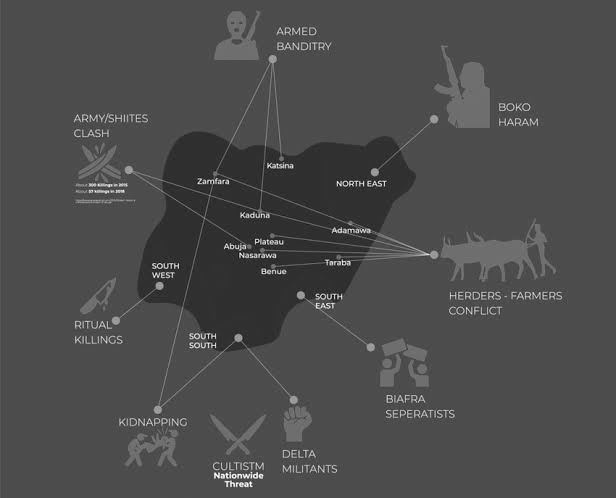From incessant operations of militant groups in the South–East, to unsettled historical clashes in the South–West, then banditry dominion in the North–West, and farmers–herders’ killings in the North–Central, the security of individual citizens in Nigeria has become a luxury only for those who are spared by fate.
Since the administration of former President Goodluck Jonathan when the issue began to grow, the country that prides itself as the giant of Africa, has been locked under the spell of insecurity, with millions of people losing their lives to unlawful killings, while others became fugitives in their land.
Despite efforts to put an end to the menace by the former’s predecessors, pumping billions of Naira to Defence and Security Sector, factors such as corruption, lack of transparency and poor accountability, among others, have led to little or no results. It’s now a trend for the Nigerian leaders to resort in negotiations with those who are supposed to be behind the bar.
Indiscriminate Attacks
A report published by the National Human Rights Commission (NHRC) showed that 570 killings and 278 kidnappings were recorded in Nigeria, as of April 2025. The implications of the above figures is damning, as the the report further disclosed a staggering 1,121 cases of child abandonment within that month, observing how the incidents drove the country to state of food insecurity, with farmers being confined in their home due to fear of attacks.
Serious human right violations were also underscored, as many have been forced to abandon their homes for safety.
Nothing less than 55 people have lost their lives to a fresh Boko Haram attack on Friday night in the insurgency bedeviled Borno state of North–Eastern Nigeria. The victims who are reported to be residents of Darul Jama were claimed to have resettled in the village, bordering Cameroon, after years of displacement due to insecurity in the region.
In Benue state, almost 200 people were killed by an unending dispute between farmers and herders in Yelewata and Dauda communities. The aftermath of the April night attacks showed a systematic gap in the country’s security, as the armed group conducted door-to-door raids, setting several households ablaze, with some people left being smoked without intervention from the security authorities.
According to the National Bureau of Statistics, Nigerians pay approximately N2.2 trillion as ransom money between May 2023 and April 2024. South–East Nigeria ranked third as the region where kidnapping incidents are dominant, with 110,432 abduction incidents, and more than N85.4 billion being paid as ransom. The secessionist struggle orchestrated by the Independent People of Biafra (IPOB) militants was cited as what jerked the insecurity in the region.
Increasing Budget, Declining Security
The Security and Defense sector receives the lion share from the 2024 Nigeria annual budget. A total amount of N3.85 trillion representing 13.38-percent of the total budget was approved to fight insecurity ravaging the country—the largest single allocation to any sector. This marks 37.99-percent increments compared to the N2.79 trillion allocated in 2023.
Again, the sector enjoys a similar opportunity in the 2025 federal government proposed appropriation bill. An estimated amount of 6.57 trillion out of 49.74 trillion total budget earmarks to fight insecurity, covering 13.20 percent of the total budget.
The country’s security was expected to improve magically owing to these huge figures. However, things take the other way round as predicted by experts based on the country’s past experiences. Insurrections continue bedeviling the nation, as corruptions, lack of transparency mars the fiscal spendings.
For instance, a 2024 report published by the Transparency International Defence and Security reveals how $8.9 million was siphon by the Nigerian officials into a bank account in Jersey, United States of America (USA). The embezzled funds were originally meant for the procurement of military equipment in a bid to equip the country’s military in its fight against Boko Haram insurgents.
The organization graded Nigeria ‘E’ in its Government Defence Integrity Index, indicating a very high risk of corruption. Moreso, the board says their assessment between 2018 and 2019 shows that Nigeria faces considerable corruption risk across its defense institutions, with extremely limited controls in operations and procurement.

